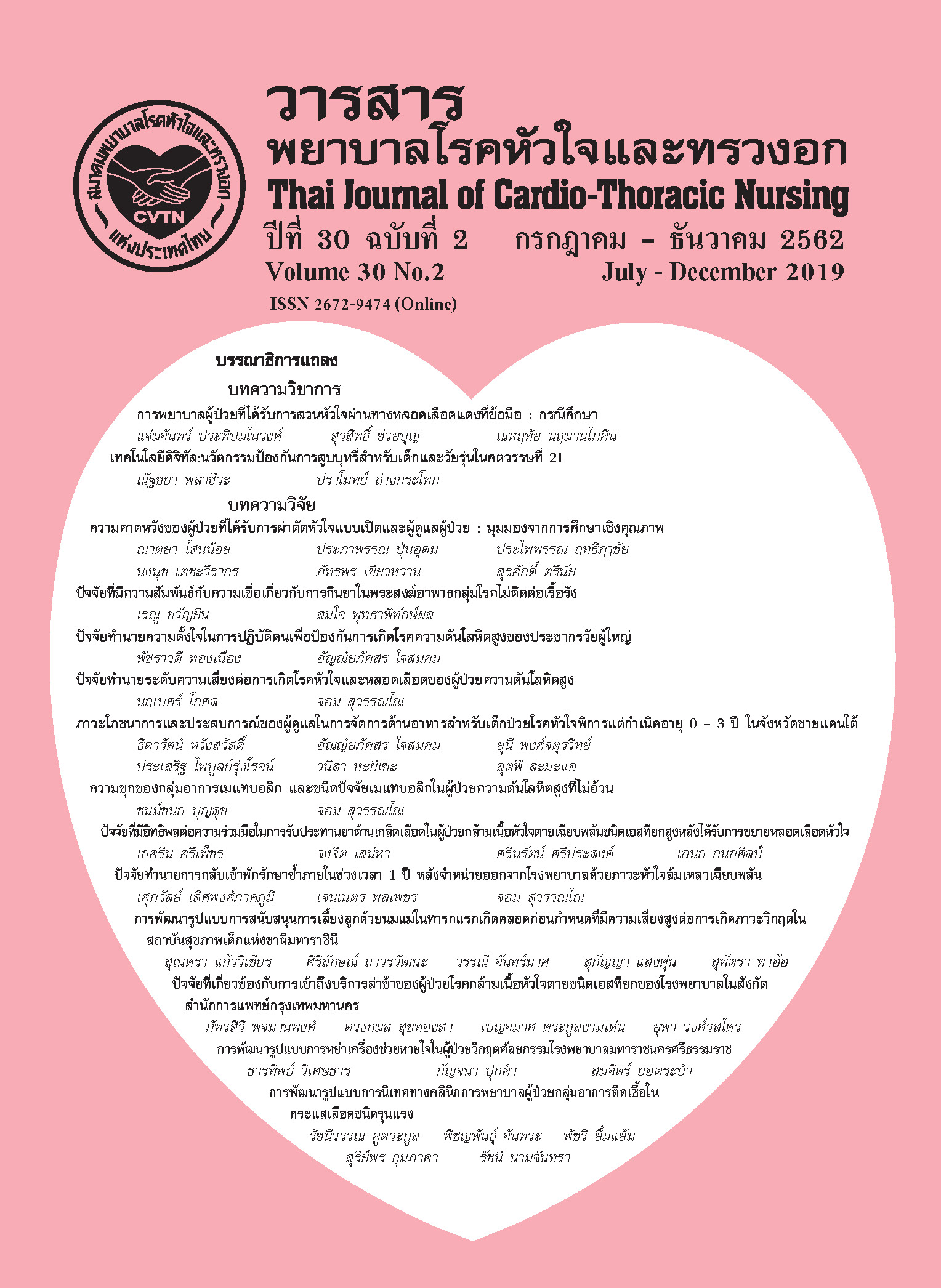The expectations of post open heart surgery patients and their caregivers: perspective from the qualitative study
Keywords:
expectations, opened heart surgery patients, family caregivers, qualitative research, nursing serviceAbstract
The objective of this qualitative study was to explore the expectations on nursing services among opened heart surgery patients and family caregivers. Data were collected via a focus group with semi-structure interview of 12 post open heart surgery patients and 12 family caregivers. Qualitative data were analyzed by using content analysis.
The results showed that receiving care with understanding was the main expectation of open heart surgery patients and caregivers. It reflected the senses of being respected and accepted by healthcare providers. In addition, the responsive expectations of care consisted of five themes emerged: (1) friendly service to meet health needs, (2) caring with generosity reflects the image of nursing services behaviors, (3) getting clear cut and sufficient health information for reducing anxiety (4) availability of environment for standard care, and, (5) safety of continuous care to promote feelings of safety when discharge.
The findings of this study can enhance nurses’ awareness and understanding with the expectations of open heart surgery patients and caregivers toward nursing services. In addition, the guideline of care should be developed based on patients and caregivers’ expectation to improve the quality of care for patients undergoing cardiac surgery in the future.
References
Kijjanon N, Deebanklong S. A comparison of length of hospital stay and complications in patients with on-pump and off-pump coronary artery bypass surgery. Ramathibidi Nursing Journal 2011;17(3):358-70. (in Thai)
Silarat M, Srijakkot J, Silarat S. Factors associated with postoperative length of hospital stay of older patients undergoing coronary artery bypass graft. Journal of Nurses' Association of Thailand, North-Eastern Division. 2013;31(3):134-43. (in Thai)
Sanckamanee Y, Ruisungnoen W. Effects of preparatory information intervention on knowledge, anxiety, and self-care practice among patients underwent coronary artery bypass graft surgery. Journal of Nurse’ Association of Thailand, North-Eastern Division. 2012;30(1):15-21. (in Thai)
Lie I, Bunch EH, Smeby NA, Arnesen H, Hamilton G. Patients' experiences with symptoms and needs in the early rehabilitation phase after coronary artery bypass grafting. Eur J Cardiovasc Nurs. 2012;11(1):14-24.
Pietrzyk E, Gorczyca-Michta I, Michta K, Nowakowska M, Wozakowska-Kaplon B. Depression in patients after coronary artery bypass grafting. Psychiatr Pol. 2014;48:987-96.
Bagheri Nesami M, Shorofi SA, Jafari A, Khalilian AR, Ziabakhsh Tabari S. The relationship between stressors and anxiety levels after cabg in Sari, Iran. Iran. Red Crescent med. j. 2016;18(5):e25407.
Aslan O, Tosun B. Cardiovascular surgery patients: intensive care experiences and associated factors. Asian Nurs Res. 2015;9(4):336-41.
Holmes SD, Fornaresio LM, Miller CE, Shuman DJ, Ad N. Development of the cardiac surgery patient expectations questionnaire (C-SPEQ). Qual Life Res. 2016;25(8):2077-86.
Joseph HK, Whitcomb J, Taylor W. Effect of anxiety on individuals and caregivers after coronary artery bypass grafting surgery: a review of the literature. Dimens Crit Care Nurs. 2015 Sep-Oct;34(5):285-8. doi: 10.1097/DCC.0000000000000137.
Humphreys M, Cottam B, Younker J, McGowan J, Angina U, Rushton C, et al. Nursing the cardiac Patient. Chicester: John Wiley & Sons, 2011, p. 112-28
Gortner SR, Jenkins LS. Self‐efficacy and activity level following cardiac surgery. J Adv Nurs. 1990;15(10):1132-8.
Alkubati SA, Al‐Zaru IM, Khater W, Ammouri AA. Perceived learning needs of Yemeni patients after coronary artery bypass graft surgery. J Clin Nurs. 2013;22(7-8):930-8.
Kalyani MN, Kashkooli RL, Molazem Z, Jamshidi N. Qualitative inquiry into the patients' expectations regarding nurses and nursing care. Advances in Nursing. 2014; Article ID 647653, 6 pages, https://doi.org/10.1155/2014/647653.
Kravitz RL. Measuring patients' expectations and requests. Ann Intern Med. 2001;134(9 Pt 2):881-8.
Chunta KS. Expectations, anxiety, depression, and physical health status as predictors of recovery in open-heart surgery patients. J Cardiovasc Nurs. 2009 Nov-Dec;24(6):454-64. doi: 10.1097/JCN.0b013e3181ac8a3c.
Hansen TB, Zwisler AD, Berg SK, Sibilitz KL, Buus N, Lee A. Cardiac rehabilitation patients' perspectives on the recovery following heart valve surgery: a narrative analysis. J Adv Nurs. 2016;72(5):1097-108. doi: 10.1111/jan.12904. Epub 2016 Jan 22.
Staniszewska S, Ahmed L. The concepts of expectation and satisfaction: do they capture the way patients evaluate their care? J Adv Nurs. 1999;29(2):364-72.
Buetow SA. What do general practitioners and their patients want from general practice and are they receiving it? A framework. Soc Sci Med. 1995 Jan;40(2):213-21.
Sixma HJ, Spreeuwenberg PM, van der Pasch MA. Patient satisfaction with the general practitioner: a two-level analysis. Med Care. 1998;36(2):212-29.
Williams B, Coyle J, Healy D. The meaning of patient satisfaction: an explanation of high reported levels. Soc Sci Med. 1998;47(9):1351-9.
Park EO, Yates BC, Meza J, Kosloski K, Pullen C. Spousal caregivers of coronary artery bypass surgery patients: differences between caregivers with low vs. high caregiving demands. Rehabil Nurs 2016 Sep;41(5):260-9. doi: 10.1002/rnj.252. Epub 2015 Nov 6.
Guest G, Namey E, Taylor J, Eley N, McKenna K. Comparing focus groups and individual interviews: findings from a randomized study. Int J Soc Res Meth. 2017;20(6):693-708.
Nastasi BK, Schensul SL. Contributions of qualitative research to the validity of intervention research. J School Psycho. 2005;43(3):177-95.
Sutheewasinnon P, Pasunon P. Sampling strategies for qualitative research. Parichart Journal,Thaksin University. 2016;29(2):32-48. (in Thai).
Graneheim UH, Lundman B. Qualitative content analysis in nursing research: concepts, procedures and measures to achieve trustworthiness. Nurse Educ Today. 2004;24(2):105-12.
Onwuegbuzie AJ, Dickinson WB, Leech NL, Zoran AG. A qualitative framework for collecting and analyzing data in focus group research. Int J Qualitative Meth. 2009;8(3):1-21.
Kalyani MN, Sharif F, Ahmadi F, Iman MT. Iranian patient's expectations about coronary angiography: a qualitative study. Iran J Nurs Midwifery Res. 2013;18(3):180-5.
Anderson KM. The advanced practice nurse cardiovascular clinician. New York: Springer Publishing Company; 2015.
Wattradul D. Cardiac rehabilitation: Transition care from hospital to home. Thai Journal of Cardio-Thoracic Nursing. 2015;26(1):89-103. (in Thai)
Downloads
Published
How to Cite
Issue
Section
License
บทความนี้ยังไม่เคยตีพิมพ์หรืออยู่ในระหว่างส่งไปตีพิมพ์ในวารสารอื่น ๆ มาก่อน และกองบรรณาธิการขอสงวนสิทธิ์ในการตรวจทาน และแก้ไขต้นฉบับตามเกณฑ์ของวารสาร ในกรณีที่เรื่องของท่านได้ได้รับการตีพิมพ์ในวารสารฉบับนี้ถือว่าเป็น ลิขสิทธิ์ของวารสารพยาบาลโรคหัวใจและทรวงอก






